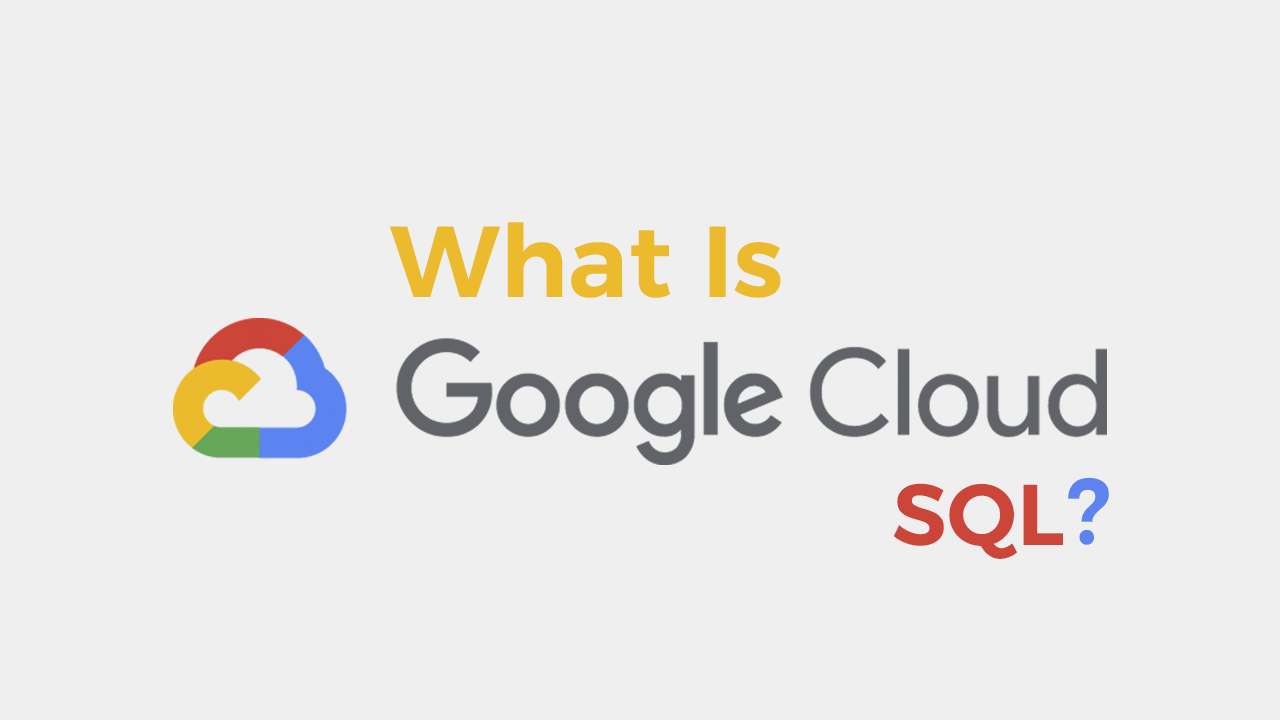
To understand how databases can effect your business, Let have a look Google Cloud SQL. One of the reasons why more and more businesses are growing on Google Cloud is to take advantage of cloud database services. Moving your workload into a cloud database has proven to be one of the smartest and profitable decisions for their businesses because it reduces management costs.
Google Cloud is one of the major cloud providers and has its own cloud-based MySQL database engine. Google Cloud SQL is a cloud version of the older MySQL relational database management system, with all the bells and whistles of MySQL DBMS with some extra features. It is also integrated with Google APP engine.
In this Google Cloud SQL tutorial, we will know all about Google Cloud SQL and include the following topics in the given order
- What is Google Cloud SQL?
- Features of Google Cloud SQL
- Limitations of Google Cloud SQL
So without any delay, let’s start.
What is Google Cloud SQL?
Google Cloud SQL is a MySQL database that resides in Google Cloud and does not require any software installation and maintenance because it is provided as a service by Google Cloud, so it is managed and administered by Google Cloud. Like a regular MySQL database, Google Cloud SQL also lets you create, modify, configure and use a relational database.
Now it’s no secret that Google is adding new features and services for their users’ on-demand requirements and for a better experience. So it was no surprise when Google made several updates in Cloud SQL a few years ago. The following Points are the most important improvements that were introduced in the latest Google Cloud SQL.
- Storage space increased from 10 GB to 100 GB.
- It was modified so that it could now allow for up to 16 GB of RAM.
- With more RAM, users can now enjoy four times more caching than before.
- Asynchronous replication was added as a feature that combines the benefits of replication and non-replication databases.
There are various other features that make Google Drive an ideal solution for small to medium-sized database workloads. Let’s take a look at these features now.
Features of Google Cloud SQL
Google Cloud SQL lets you easily move your MySQL database to the cloud and gives you a similar interface to work on. Some other features of Google Cloud SQL are:
- Easy to Use: Google Cloud SQL has an intuitive and graphical user interface that lets you know about building your database instances with just one click of the mouse, to avoid remembering a series of complex commands. If you are more used to using commands to handle your databases, you can do so on Google Cloud. Google Cloud provides a fair degree of control on how you use Google Cloud SQL.
- Managed by Google: Google Cloud SQL is fully managed by Google, so you get your data management tasks such as patch management, replication, and other similar Google-operated tasks.
- Highly Available: Google fulfills the promise of making your data available to you, regardless of any data center.
- Compatibility with other Google Cloud Services: You can use Google Cloud SQL without any other service provided by Google Cloud, along with your favorite Google products like Google Sheets without worrying about configuration and installation.
- Security: Google manages the updates and automatic backups of your data as well as providing top-notch security for your database. Therefore, even if there is a big failure or data violation, your data is always safe and your database is always available.
Some added features:
- Billing: As Google Cloud SQL is provided as a service, you get the same payment option as you would with any other Google cloud service. A payment option for the data is also called a payment option which you most often access, which can be more cost-effective in these situations.
- Faster: Added storage space and RAM resulting in large databases, more data, and faster data access.
- Compatibility with languages: Google Cloud SQL is designed to be compatible with Java and Python.
Limitations of Google Cloud SQL
Google Cloud SQL comes with added features, there is no doubt about it, but there are some features of MySQL that Google Cloud SQL does not support. Let’s take a look at some of them:
- Google Cloud SQL does not support functions defined by the user.
- There is also no support for some MySQL statements such as
- 1) CREATE FUNCTION
- 2) INSTALL/UNINSTALL PLUGIN
- 3) LOAD_FILE( )
- 4) SHA2( )
- 5) SELECT—INTO OUTFILE
- Google Cloud SQL does not support super privilege
It is well known that Google Cloud is shutting down and there is no plan to slow down its growing growth. That being said, Google Cloud SQL is definitely worth a try, because you are compelling yourself to work on projects where the benefits will go beyond the boundaries. Or it may be that Google Cloud SQL can be just the database solution you need because the limit is unimportant for your project or operation. So this brings us to the end of this Google Cloud SQL tutorial.